
Claiming Your Call for a Climate-Changed World
A Three-Day Retreat and Community of Practice
for teams from New England congregations
The BTS Center received applications from two dozen New England congregational teams and has selected 12 congregations to participate in this three-day retreat and community of practice.
Dates: Thursday, June 20, 2024 (11:00 am) through Saturday, June 22, 2024 (1:00 pm)
Location: Schoodic Institute, Winter Harbor, Maine
Enrollment fee: As an expression of The BTS Center’s commitment to helping congregations step into their calls to transformational ministry in a climate-changed world, this program is offered without an enrollment fee.
We are no longer accepting applications for this program.
We are pleased to announce the cohort of churches who participated in the Claiming Your Call Retreat. We welcomed the teams from these communities at the Schoodic Institute in June!
Allen Avenue Unitarian Universalist Church – Portland, ME
Cape Elizabeth United Methodist Church – Cape Elizabeth, ME
Church of the Covenant – Boston, MA
First Congregational Church of Camden – Camden, ME
First Congregational Church of West Tisbury – Martha’s Vineyard, MA
First Congregational Church – South Portland, ME
Main Street United Methodist Church – Nashua, NH
Mennonite Congregation of Boston – Cambridge, MA
Saint Paul’s Episcopal Church – Brunswick, ME
Saint Paul’s Episcopal Church – Lynnfield, MA
Taftsville Chapel Mennonite Fellowship – Taftsville, VT
Union Congregational Church of Hancock – Hancock, ME
There is no denying that we live in a climate-changed world. Climate change is not just a social cause. It is our weather. It is the flooding and wildfire smoke in our communities. It is the record-breaking heat. It is an intensifying crisis happening at a scale unlike any other crisis we’ve previously encountered, and it is one that demands a radical re-envisioning of what it means to be human on planet earth.
Responding to this crisis is not just the work of scientists, policymakers, and advocates. The church brings spiritual resources to this moment that cannot be filled by any others. Our world is crying out for bold, prophetic moral leadership that can truthfully name the predicament and transform the misguided priorities that have brought this crisis to our doorstep. With rich histories of advocating for justice and providing care for those most in need, faith communities have the opportunity to envision and nurture a world in which people turn towards one another rather than against each other in the face of intensifying challenges.
What is the role for your church? If your church has felt called to respond transformationally to this moment in the context of your local watershed, this retreat will help you enter into a season of rich vocational formation in order to claim and deepen your congregation’s unique call to ministry in a climate-changed world.
Participating congregations will:
- Enter into a rich time of community building, learning, and vocational formation with theologians, scientists, and indigenous leaders.
- Learn about the unique role that the Christian tradition and your congregation can play in a climate-changed world in offering care and advocating for justice in the places you call home.
- Engage in place-based formation with the grounds of Acadia National Park as your classroom.
- Build supportive community with members of your congregation, as well as with like-minded leaders from other congregations across New England.
- Worship, sing, and play in one of the most beautiful outdoor settings in New England.
- Integrate what you’ve learned by participating in a Community of Practice from July through October 2024, including taking on a “small experiment with radical intent,” supported by a community of peers.
Our Venue:
Named one of the top venues for nature lovers in the country, the Schoodic Institute is located in Acadia National Park and is Acadia’s primary partner in science and education. Located on the rugged Maine coastland, surrounded by thousands of acres of evergreen forests, the park hosts conferences, retreats, and workshops for groups from around the globe. For those traveling from farther away, there is the possibility of staying independently at the Schoodic Institute before and after the retreat.
We are no longer accepting applications for this program.
Meet Our Leadership Team
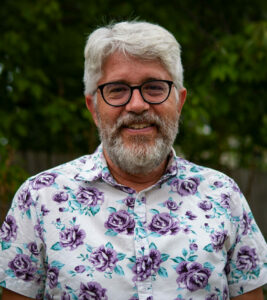 Doug Kaufman
Doug Kaufman
Doug Kaufman is a pastor and environmental activist who began as executive director of Anabaptist Climate Collaborative July 2023, after having served as director of pastoral ecology since 2018. Doug first became passionate about creation care during his 23 years as a pastor at Benton Mennonite Church, Goshen, IN. As they were preparing to baptize new members in the Elkhart River, they discovered that the health department did not recommend contact with the water, because it would become compromised with too much manure. This began a journey for him and the congregation. He started a Hoosier Riverwatch group in the congregation and discovered just how much the Bible talks about God’s care for rivers and all the more-than-human creation. In their pursuit of watershed discipleship, they began a green group, organized river cleanups, installed solar panels, added recycling, and became a Green Patchwork congregation with Mennonite Creation Care Network. The congregational vision includes “pursuing God’s peace at the river.” As Doug pursued a Th.M. in theology and ecology at the University of Toronto, he was invited to become director of pastoral ecology at ACC’s predecessor. In this role he developed pastoral retreats on climate change, and has engaged the broader Anabaptist community, ecumenical churches, and interfaith groups. There he advocates for pastoral approaches to climate change that includes pastoral care, worship, practical and political action. He studied at Anabaptist Mennonite Biblical Seminary, Elkhart, IN, Fuller Theological Seminary, Pasadena, CA, and Goshen College. He is also trained as an Indiana Master Naturalist. He previously served as a conference minister with the Indiana-Michigan Mennonite Conference. Oh, and during covid he converted his backyard from a church parking lot to a native rain garden, lawn, and vegetable garden.
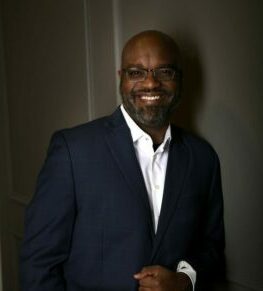 Derrick Weston
Derrick Weston
Derrick Weston is a writer, filmmaker, podcaster, speaker, and educator whose most recent work has focused on the intersection of food and faith. He serves as the Theological Education and Training Coordinator for Creation Justice Ministries. Derrick is the co-host of the Food and Faith podcast and producer of Spoon, Spade, and Soul, a podcast highlighting food and land-based ministries in the Episcopal church. Additionally, he is the producer of the short film series "A Wilderness Like Eden" highlighting the work of churches engaged in food justice work. After two decades of being a pastor and community organizer, Derrick is a strong believer in the potential of local congregations to enact change in their communities. Derrick received his B.A. in film studies from the University of Pittsburgh and his Masters of Divinity from San Francisco Theological Seminary. He also has a certification in health ministry from Wesleyan Theological Seminary and was a part of the Re:Generate fellowship on food, faith, and ecology through Wake Forest Divinity School. Derrick is the co-author of the book The Just Kitchen: Invitations to Sustainability, Cooking, Connection, and Celebration and has written numerous articles for several publications. He and his wife Shannon have four children and live outside of Baltimore, Maryland.
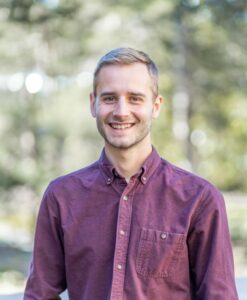 Avery Davis Lamb
Avery Davis Lamb
Avery Davis Lamb is Co-Executive Director of Creation Justice Ministries. Creation Justice Ministries’ mission is to educate, equip and mobilize communions and denominations, congregations, and individuals to protect, restore, and rightly share God’s creation.
Avery has a background in both ecological research and faith-based environmental organizing, studying ecology in various ecosystems and organizing faith communities across the country in support of action on environmental justice. Previously he has worked for Sojourners and Interfaith Power & Light. He serves on the board for The Center for Spirituality in Nature and is a Fellow with the Re:Generate Program at Wake Forest Divinity School and the Foundations of Christian Leadership Program at Duke Divinity School.
Avery has a Bachelor of Arts in Biology and Sustainability from Pepperdine University. Currently, he is at Duke University pursuing a Master of Environmental Management in Ecosystem Science & Conservation and a Master of Theological Studies, with certificates in Faith, Food & Environmental Justice and Community-Based Environmental Management. His research focuses on the role of religious communities in building climate resilience and adaptation, with emphasis on the virtue of “climate hospitality.”
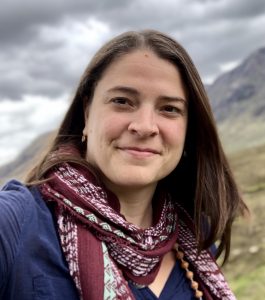 Rev. Nicole Diroff
Rev. Nicole Diroff
Rev. Nicole Diroff is ordained in the United Church of Christ and serves as Program Director at The BTS Center, where she coordinates the planning, implementation, and evaluation of the Center’s programmatic offerings. She holds expertise in facilitation, data management, and strategic planning. Nicole is a certified Maine Master Naturalist, serves as Chair of the Spiritual Formation Committee at Williston-Immanuel United Church and Co-Chair of the Diversity, Equity, Inclusion Committee for the Scarborough Public School District. She lives with her family in Scarborough, Maine.
Prior to her work with The BTS Center, Nicole served as the Associate Director at Interfaith Philadelphia, where she coordinated the Religious Leaders Council of Greater Philadelphia and directed the creation and expansion of the organization’s many Dare to Understand initiatives.
Nicole is a graduate of the Lutheran Theological Seminary at Philadelphia and Ohio Wesleyan University. When she’s not leading programs or facilitating meetings, she can be found exploring tide pools with her son, hiking with her dogs, or reading a memoir at a local coffee shop.
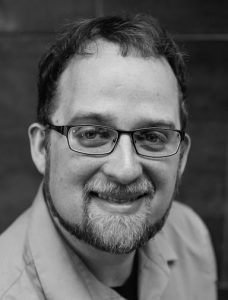 Ben Yosua-Davis
Ben Yosua-Davis
Ben Yosua-Davis serves on The BTS Center staff team as Director of Applied Research, where he shapes the organization’s posture of “rigorous and reverent curiosity,” focused on research that supports and shares the wisdom of on-the-ground practitioners working in a climate-changed world. He is a graduate of Drew Theological Seminary and Colby College.
Previously, he lived in Haverhill, MA, where he co-planted a new church called The Vine, one of the earliest mainline missional church expressions in the country, and hosted a podcast entitled, “Reports From the Spiritual Frontier,” which chronicled the day-to-day lives of leaders innovating new forms of spiritual community.
He is also worship leader for the Academy for Spiritual Formation, a formation process in the foundations of Christian spirituality, which welcomes leading spiritual thinkers from across the ecumenical spectrum.
Ben is a Maine native and now lives on Chebeague Island, Maine with his wife, Melissa, his son Michael, and his daughter, Genevieve; where he directs the community chorus and delivers tins of cookies to unsuspecting neighbors. When not wearing one of his myriad hats or hanging out with his children, you’ll probably find him playing Dungeons and Dragons, watching basketball, or renovating his old island farmhouse.
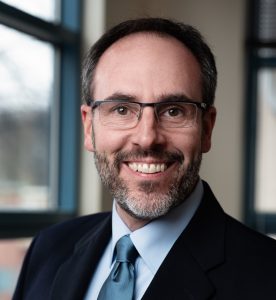 Rev. Dr. Allen Ewing-Merrill
Rev. Dr. Allen Ewing-Merrill
Meet Our Presenters
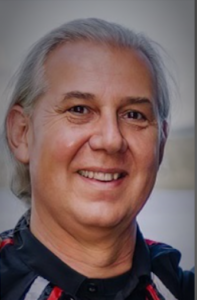 John Bear Mitchell
John Bear Mitchell
John Bear Mitchell is a citizen of the Penobscot Nation from Indian Island in Maine. He presently serves as the University of Maine System Office Native American Waiver and Educational Program Coordinator, University of Maine’s Wabanaki Center Outreach and Student Development Coordinator, as well as a Lecturer of Wabanaki Studies and Multicultural Studies at the University of Maine in Orono. He has served on numerous museum and educational boards throughout the state with missions based on Maine’s Wabanaki people. For 15 years, John visited schools in Maine as a Maine Touring Artist delivering an Arts in Education program. He has a life-long commitment to education and is known for his traditional singing and storytelling.
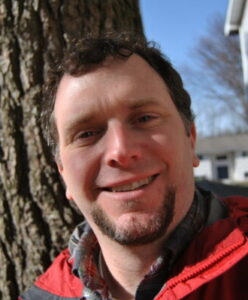 Chris Nadeau
Chris Nadeau
As Climate Change Adaptation Scientist, Chris Nadeau studies how to adapt natural resource management practices to climate change. His research ensures the money we invest in natural resource management today will continue to provide benefits under uncertain future climates. Chris’s work spans diverse ecosystems, ranging from restoring seagrass beds on the bottom of the ocean to sustaining plants on the top of mountain summits. He loves that the many ecosystems surrounding the Schoodic Institute offer opportunities to continue this diverse work.
Prior to joining Schoodic Institute, Chris spent 20 years using science to support natural resource decision making. He spent 10 years as a Wildlife Biologist at the University of Arizona, before completing graduate degrees at Cornell University and the University of Connecticut. When he isn’t working, Chris is out in nature, biking, hiking, running, fishing, or bird watching.
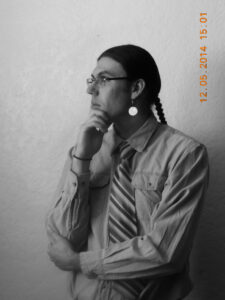 Jason Brough
Jason Brough
Jason Brough is a citizen of the Northwestern Band of Shoshone Nation. His research interests center around Indigenous Sovereignty, Food Sovereignty, Indigenous Archaeologies, and Climate Change. Jason received his Bachelor’s from Utah State University in Anthropology with a minor in Environmental Science. Jason has participated in or led several archaeological field expeditions, including at Dinosaur National Monument, Dugway Proving Grounds, the Shoshone Basin, and on the coast of Maine. He greatly enjoyed serving as USU’s President of the Native American Student Council and interacting with various Indigenous Nations. Being Shoshone or Newe is everything to Jason, thus his background and experiences proved to be vital in his work with the Wabanaki Youth in Science Program and Penobscot Nation’s Traditional Ecological Program since 2018. Currently, Jason has been tasked to lead and develop content for the Bear River Massacre Cultural Center, including restoring Indigenous plants to the Bear River Massacre Site, as well as having served on the Daigwade Board (A mix of language and culture revitalization effort). Jason has taught classes through the University of Maine on archaeology and contemporary Indigenous issues. In these settings, he has emphasized relationality and honor, the importance of working with Indigenous communities, and always remembering to give back to the people and more-than-human others that we interact with.
Meet Our Retreat Musician
Rev. Liz Fulmer
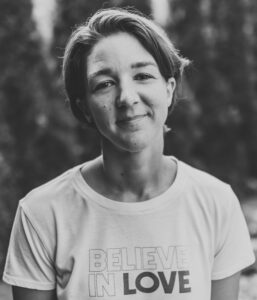 Rev. Liz Fulmer (she/her) is a queer pastor and musical storyteller serving Grandview Church in Lancaster, Pennsylvania. Trained as a songwriter and vocal principle at Berklee College of Music and spiritually formed through the care and teaching of Lancaster Theological Seminary, Fulmer is passionate about facilitating divine encounter through the blending of breath, music, word, and community. A multi-instrumentalist, she has 3 albums of original music: Heaven Knows (2016), Ellipsis (2018), and The Bible Tells Me So (2023). Liz has been a guest lecturer at Millersville University and Lancaster Theological Seminary, teaching on the craft of songwriting and how to effectively combine music and visuals to create accessible and meaningful worship experiences. She was ordained in 2020 by the Movement of Inclusive Methodists. Liz feels called to the work of sacred space-making, particularly for those who have been made to feel unworthy or unacceptable in the eyes of the Christian Church for any reason.
Rev. Liz Fulmer (she/her) is a queer pastor and musical storyteller serving Grandview Church in Lancaster, Pennsylvania. Trained as a songwriter and vocal principle at Berklee College of Music and spiritually formed through the care and teaching of Lancaster Theological Seminary, Fulmer is passionate about facilitating divine encounter through the blending of breath, music, word, and community. A multi-instrumentalist, she has 3 albums of original music: Heaven Knows (2016), Ellipsis (2018), and The Bible Tells Me So (2023). Liz has been a guest lecturer at Millersville University and Lancaster Theological Seminary, teaching on the craft of songwriting and how to effectively combine music and visuals to create accessible and meaningful worship experiences. She was ordained in 2020 by the Movement of Inclusive Methodists. Liz feels called to the work of sacred space-making, particularly for those who have been made to feel unworthy or unacceptable in the eyes of the Christian Church for any reason.
Meet Our Event Hosts
 With roots dating back to 1814, The BTS Center is a private foundation in Portland, Maine, building on the legacy of the former Bangor Theological Seminary. Today The BTS Center seeks to catalyze spiritual imagination, with enduring wisdom, for transformative faith leadership. Guided by the vision of human hearts renewed, justice established, and creation restored, The BTS Center offers theologically grounded workshops and retreats, learning cohorts, courses, public conversations, and projects of applied research, all focused around spiritual leadership for a climate-changed world.
With roots dating back to 1814, The BTS Center is a private foundation in Portland, Maine, building on the legacy of the former Bangor Theological Seminary. Today The BTS Center seeks to catalyze spiritual imagination, with enduring wisdom, for transformative faith leadership. Guided by the vision of human hearts renewed, justice established, and creation restored, The BTS Center offers theologically grounded workshops and retreats, learning cohorts, courses, public conversations, and projects of applied research, all focused around spiritual leadership for a climate-changed world.
 The Anabaptist Climate Collaborative works to inspire and equip individuals and organizations to address climate change through the perspective of climate justice, and through Anabaptist values, community, and faith. The Anabaptist Climate Collaborative recognizes climate change as one of the most crucial moral challenges of our time, and works toward climate justice through a focus on targeted strategies oriented toward promoting engagement and understanding through the perspectives of justice, peacebuilding, and reconciliation.
The Anabaptist Climate Collaborative works to inspire and equip individuals and organizations to address climate change through the perspective of climate justice, and through Anabaptist values, community, and faith. The Anabaptist Climate Collaborative recognizes climate change as one of the most crucial moral challenges of our time, and works toward climate justice through a focus on targeted strategies oriented toward promoting engagement and understanding through the perspectives of justice, peacebuilding, and reconciliation.
 Creation Justice Ministries’ mission is to educate, equip and mobilize communions and denominations, congregations, and individuals to protect, restore, and rightly share God's creation. Creation Justice Ministries’ membership includes Baptist, Historically Black, Orthodox, Peace, and mainline Protestant traditions. With a particular concern for people who are most vulnerable and marginalized, Creation Justice Ministries provides collaborative opportunities to build ecumenical community, guides people of faith and faith communities towards eco-justice transformations, and raises a collective witness in the public arena echoing Christ's call for just relationships among all of creation.
Creation Justice Ministries’ mission is to educate, equip and mobilize communions and denominations, congregations, and individuals to protect, restore, and rightly share God's creation. Creation Justice Ministries’ membership includes Baptist, Historically Black, Orthodox, Peace, and mainline Protestant traditions. With a particular concern for people who are most vulnerable and marginalized, Creation Justice Ministries provides collaborative opportunities to build ecumenical community, guides people of faith and faith communities towards eco-justice transformations, and raises a collective witness in the public arena echoing Christ's call for just relationships among all of creation.

